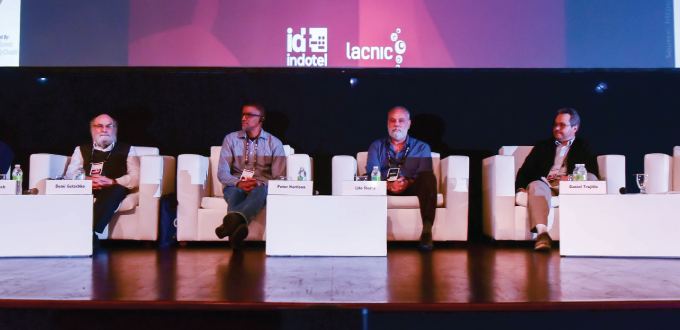Half-a-Century of the Internet
30/05/2019

We have grown from the first “login” sent 50 years ago between two computers to the present day reality of millions of video reproductions per minute on the web, infinite commercial transactions per second and terabytes uploaded to clouds all over the world. Data transmission between computers celebrated its 50th anniversary and LACNIC organized a panel with Internet pioneers to honor such event in Punta Cana.
“From that first humble message to a reality in which millions of events take place on the Internet.” This is how Tomas Lynch began the panel which featured five referents from the region who shared with the Latin American and Caribbean community about their first Internet experiences.
Through a video recorded for the panel opening, Ida Holz, the first Latin American to be inducted into the Internet Hall of Fame, recalled her first network experiences and referred to them as a fascinating moment in history. “It generated a totally different, immediate form of communication that brought people closer together,” Holz added.
In her speech, Demi Getschko, who connected Brazil to the Internet for the first time, called for the defense of the original values and ideals of the Internet. “Those (values) need to be preserved, as we must avoid a breach of trust and proliferation of abuse. We have to weigh up the benefits we receive from the Internet against its risks,” Getschko said.
He expressed concern about the excessive initiatives to protect users and control risks. “Let us not lose the main benefit of the Internet, which is openness, an unimaginable openness before the Internet existed,” he concluded.
Lito Ibarra from El Salvador said that after half a century of the Internet, one of the challenges is how to face the vigorousness of this technological force. “How do we talk about matters that should or should not be regulated, what things should be planned, how our children and grandchildren should be educated to successfully live together in an environment permeated by accelerated performance,” said Ibarra.
Meanwhile, Daniel Trujillo from Mexico assured that the Internet allowed his country to open up to the world. He recounted a 30-year-old anecdote when Tecnológico de Monterrey was inaugurated and President Carlos Salinas was given a demonstration of how the Internet works. “After that visit, President Salinas privatized Telmex, which turned it into a big company, and then signed the FTA between Mexico, the United States and Canada. These steps allowed us to move from a closed and worn out economy to an entirely open and free trade one. This is the legacy of the first Internet connection in Mexico,” Trujillo commented.
The fifth panelist, Peter Harrison from Jamaica, related the difficulties of Internet access on the island when he was a young student. He said that when he was in college he “heard about the Internet” but there was no connection in Jamaica. After a long time the Internet came to the island as a great opportunity.
(Free access, no subscription required)